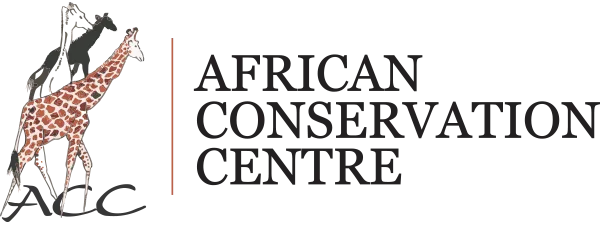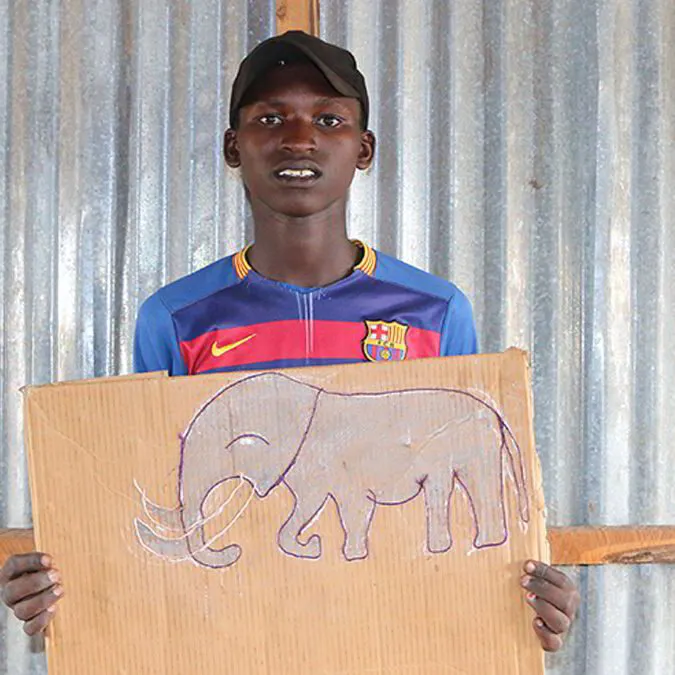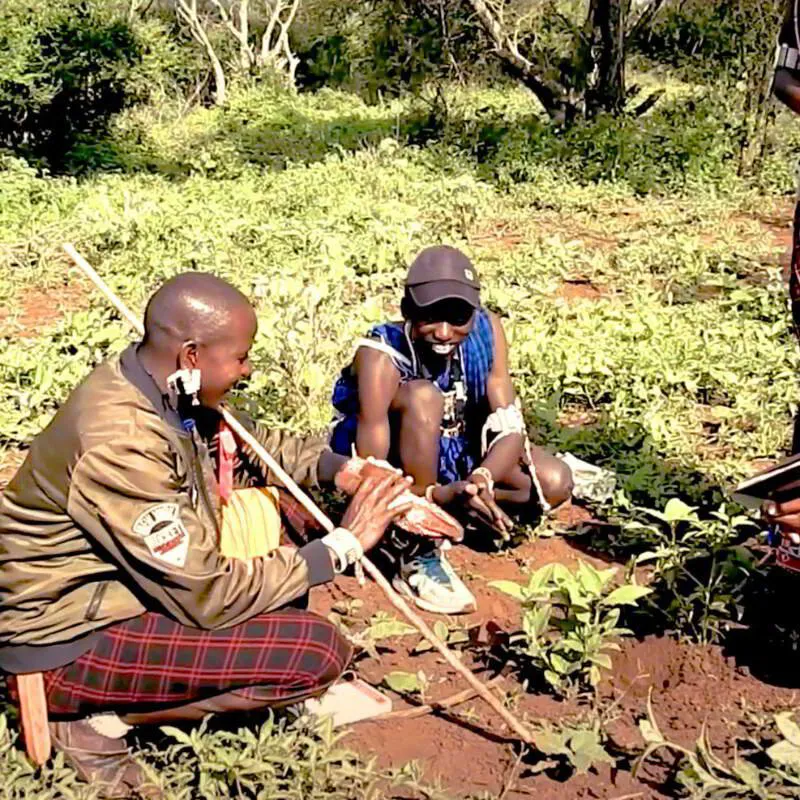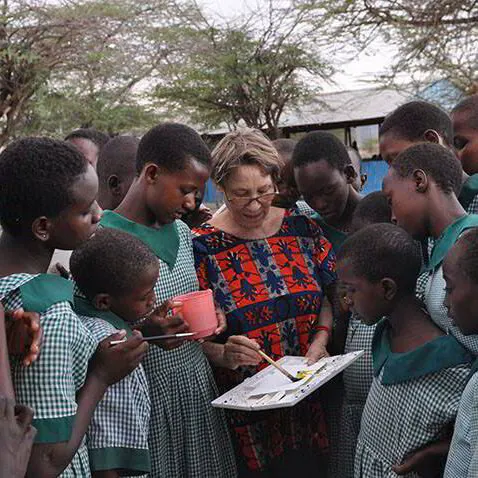Conservation Education
OVERVIEW
Our educational programmes address environmental conservation issues including the values of traditional practices/elder knowledge, sustainable resource use, rangeland management, human-wildlife coexistence, wildlife, tourism, ecosystems and biodiversity. The curriculum is taught in a practical, experiential way incorporating field trips, guest scientists, and the arts.
Over the years, we've collaborated with numerous partners, including EuropeAid, Wildlife Clubs of Kenya, Uaso Ngiro Baboon Project, and staff from NYC's School of the Visual Arts, to bring experiential conservation education to youth and prepare the next generation of conservation leaders. We are excited to build upon these programs in 2022 and beyond!
CONSERVATION EDUCATION OUTREACH PROGRAMME
We are excited to announce that ACC will expand its conservation education outreach program in 2022 thanks to a generous donation from Gigi Seasons! Our program focuses on children in the local schools and areas surrounding Amboseli National Park in Kenya. In 2022, education staff will conduct programs for 2,500 students (ages 10-16), provide eleven field trips for 330 students, and provide educational materials for students and schools.
Maasai communities living near Amboseli have traditionally coexisted with wildlife and have vast knowledge about their environment. However, as the human population grows and pressure to sub-divide land and change traditional pastoralist ways of life increase, many Maasai youth are losing their connection to nature.
In fact, complications from land development, sedentarization and climate change are creating increased human/wildlife conflicts which create negative feelings towards wildlife and result in more conflict. There is an urgent need to engage young Maasai community members in environmental educational opportunities that incorporate indigenous knowledge, science, art, and innovation so they can make informed decisions about their livelihoods and be empowered as the next generation of conservationists!
Environmental education outreach is a longer term but critical way to give communities informed voices to engage in environmental issues impacting them. It is an important aspect of reducing conflict with wildlife and enhances human/wildlife co-existence. It builds a stronger affinity with the natural world that has lasting beneficial impacts for individuals, communities and our planet!
ACC’s conservation education outreach program will increase awareness and empower Maasai youth in the following ways:
School Programs
ACC’s outreach officer will work with wildlife clubs in schools, addressing environmental conservation issues specific to the area. Values of traditional practices, sustainable resource use, rangeland management, human/wildlife coexistence, values of wildlife and tourism, ecosystems and biodiversity will all be covered in the curriculum.
Education programs will be engaging and incorporate drama, games, art, poetry/writing, talks by local scientists, and discussions on current, relevant topics such as land-subdivision. We will also provide wildlife/nature themed films to students and the larger community to inform and excite them about their environment and broaden their knowledge of the world. Educational materials will be distributed to students that specifically relate to local flora and fauna and conservation/pastoralist issues. Materials will also include tree saplings for children to plant around their schools.
Field Trips
In 2022, ACC will take 280 youth to Amboseli National Park and 45 youth to Rombo Wildlife Conservancy. Most students near Amboseli have never been to Amboseli even though they live very close to it. The field trips will enable them to meet and talk with park scientists, learn about elephant conservation and how to mitigate and avoid human/wildlife conflict - something they live with every day. Rombo, students will learn to identify birds and gain an understanding of the significance of each bird to Maasai culture and their role in the greater ecosystem. Environmental education outreach is a longer term but critical way to give communities informed voices to engage in environmental issues impacting them. It is an important aspect of reducing conflict with wildlife and enhances human/wildlife co-existence. It builds a stronger affinity with the natural world that has lasting beneficial impacts for individuals, communities and our planet!
OUR IMPACT & PARTNERS
During the past three years, we've worked with 1,354 students among eight public schools located in the Amboseli ecosystem. Our Conservation Education Programme was one of the most valuable initiatives to arise through the EU trans-border project, CONNEKT. This programme was linked to Wildlife Clubs of Kenya, and operated by ACC in Kenya and by Oikos in Tanzania. It was supported by EuropeAid.
We are so pleased to include Gigi Seasons as a new education partner in 2022. Thanks to their Gigi Cares Projects for Humanity program, ACC has been able to expand our education program and fully fund it for a year. We are grateful for this new partnership!
TEACHER TRAINING
ACC and Wildlife Clubs of Kenya (WCK) collaborate to provide environmental education training for teachers from the Amboseli ecosystem at Kimana Secondary School. The goal of the training is to build the teachers’ capacity to teach school children about wildlife and conservation.
After the two-day training the teachers are certified as “Conservation Patrons” in their respective schools. As Patrons, the teachers educate students about the environment, initiate and promote small projects within the school, and organize tours for students to visit national parks. They are encouraged to involve the entire school when implementing their projects including students, teachers, and non-teaching staff. In addition, the teachers have formed a network for collaborative learning among their communities.
Some of the planned activities include planting more than 2,000 trees, carrying out clean-up exercises, constructing study benches under trees and beautifying schools by planting flowerbeds along school terraces.
The three-year CONNEKT project is a partnership between ACC and OIKOS-EA from Tanzania and is funded by the European Union. This Kenya-Tanzania cross-border project in the greater Kilimanjaro-Amboseli ecosystem aims to secure wildlife migrations, decrease wildlife crime, and encourage community participation in transboundary conservation.
Learn more about our Teacher Training Programme and our partnership with OIKOS-EA in the videos below.
ART FOR CONSERVATION
Engaging Children in Conservation and Cultural Heritage Through Art
Since 2005, Deborah Ross, a fine art lecturer at The School of Visual Arts in New York City and one of America’s leading wildlife artists, has led watercolor painting workshops in remote African villages to empower voices for conservation. Her Kenyan workshops provide a forum for children to learn from elders about Maasai culture and traditions. As the elders tell their stories, the children capture them in art. The children are given paint, brushes and paper and encouraged to explore their own personal vision of the world around them. In addition to being a fun way for children to learn about their heritage, these workshops result in paintings that are an important visual record of indigenous knowledge.
“When there is no one who remembers, there can be no language to speak to the ancestors with. And no way of passing on history and traditions.” — Siranga Naimando
In 2014, through the help of Joel Njonjo and ACC, Ross introduced painting lessons to three different schools in the South Rift through Lale’enok’s Education Outreach Program. Students at Olkiramatian Primary School, Patterson Secondary School, and Oloika Primary School have learned how to paint trees, birds, wild animals and various aspects of their community. These workshops have benefitted students in the following ways:
— Provide students with a new medium to express themselves
— Enable students to realize and develop their talents
— Encourage students to look at and interpret their environment in new ways
— Connect generations and captures indigenous knowledge
— Facilitate the local students to publish a painted guide book of the local natural resources within Olkiramatian and Shompole group ranches
About the Artist
NYC Artist Deborah Ross has a mission – to alert the world to the diminishing wildlife and forests via art and publications. She started her career as a freelance artist for the New York Times and the New Yorker in the ’80s. Now she is one of America’s leading wildlife artists whose work has appeared in zoos, botanical gardens, and aquariums across the United States. She travels to Madagascar, Kenya, Tanzania, and Uganda to study and draw portraits of the animals. In 2011, Deborah Ross worked with Siranga Naimando to teach children at Il Polei Elementary School how to paint and document local plants and animals. This workshop resulted in a beautiful booklet of watercolor paintings of traditional Maasai medicinal plants – Olcani, An Illustrated Guide to the Medicinal Plants of Kenya. The children’s paintings have also been exhibited throughout Kenya and in the U.S. as a travelling exhibit.





